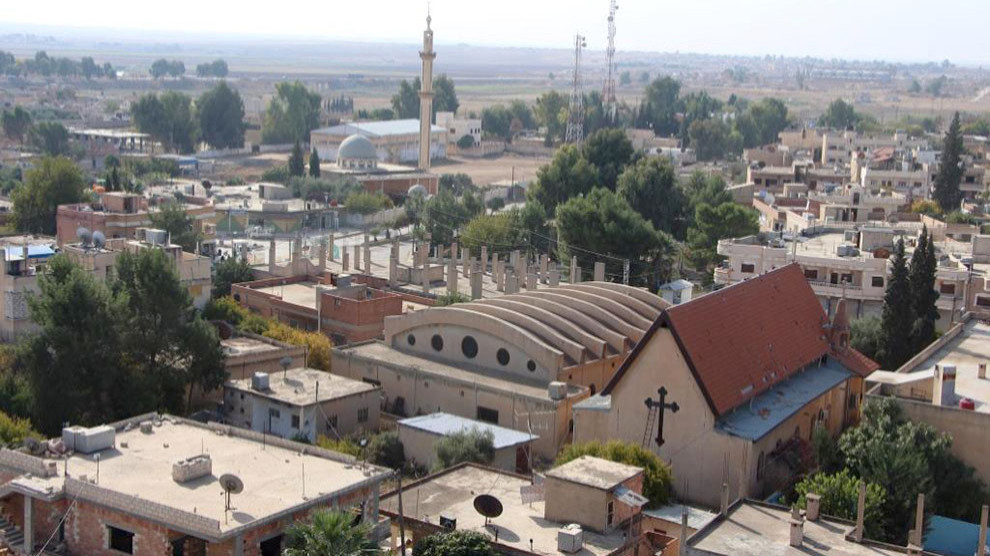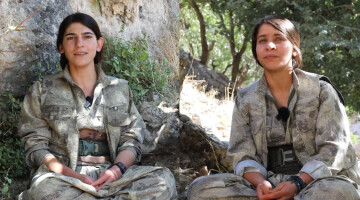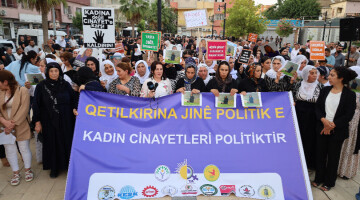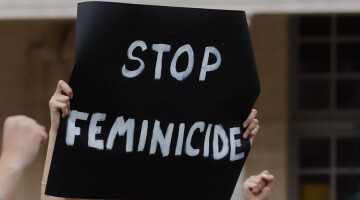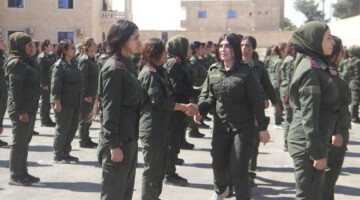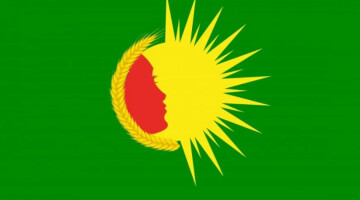We, a group of women from the Women Defend Rojava campaign, were on our way to Til Temir (Tell Tamer). I always knew Til Temir as a town in northern Syria where many different population groups live together. We wanted to conduct interviews and talk especially to Assyrian women to see how they experience the current war situation and how they resist. On the way between Hesekê (al-Hassakah) and Til Temir, we drove along the Xabûr river, where many Assyrian villages are located. The further we go, the more clearly we see black clouds of smoke rising. “That’s Til Temir,” says our driver, “and that’s where the front line is.” She points her finger in our direction. The wads of thick dark smoke came from car tires that were set on fire to blur vision for the Turkish air force. In the last few days the area around Til Temir had been bombed several times. Fierce battles were taking place between the Syrian Democratic Forces (SDF) and Erdoğan’s occupation forces. Villages were taken by the invading troops and liberated again by the friends. The past days had been a constant back and forth. Now the front was only four kilometers away from the city. We arrived in Til Temir and saw life in the city. Shops were open, taxi drivers stood at the roadside and people bought vegetables at the market. Only the rush revealed that the war is very close.
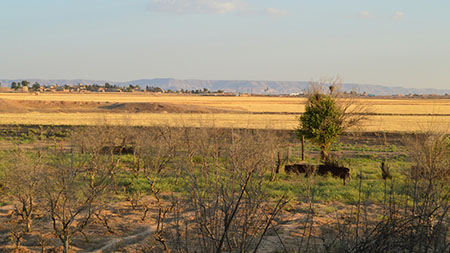
We met Gulistan, a friend of Kongreya Star, who lives in Til Temir, speaks Kurdish and Arabic and would translate for us. We wanted to interview Assyrian women and walked through an Assyrian quarter with Gulistan. Some houses were empty because the families had fled from the approaching occupation troops. As we walked through the quarter, we suddenly heard loud flying noises from the air; loud and just above our heads, two huge helicopters are flying. They kept turning and flying low manoeuvres over our heads. People came out of their houses and looked up to the sky, frightened. After a few seconds, the first shout in relief: “Rûs an Emerikî!” – Russians or Americans. A woman holding a phone turned to us. Relatives would call and ask if they were bombing. “No, no, it’s the Americans,” she had told them, “they’re not bombing.” The fear of air raids is great. In recent days, unmanned drones had bombed from the air several times. This time it is the Americans, who are scaring the population with their flight maneuvers.
After walking around for a while, an elderly Assyrian woman invited us into her house and said that she is willing to give us an interview. She is 71 years old, only had a few teeth left in her mouth, and the deep wrinkles on her face were witnesses of her long life. In her house, we met her son. They lived there together. He was unmarried and took care of her. The little Jesus pictures and the way the woman wore her headscarf reminded me of my grandparents’ apartment in Bavaria. Even the furniture felt familiar. It was more similar to the way the houses are furnished in Germany than to the Kurdish and Arab families I have often visited.
We sat down on a couch and without having to ask much, the woman started to talk. Since we do not speak Arabic, Gulistan translated for us. Nevertheless we understood what it is all about because of her facial expressions and gestures. She pointed to a wedding photo on the wall. “Australia”, then she made a twisting gesture, which was supposed to refer to the neighborhood, and said: “Holland.” She talked about how many Assyrian families had left. And again and again the word “DAEŞ”, Islamic state. We asked her about her past and life in Til Temir. “Our neighbors are Kurds. We have lived peacefully side by side. I can’t speak their language, but I do understand them,” she said and laughed out loud. She put her hand over her mouth, laughed even louder and said that we shouldn’t film the few teeth she had left. She laughed even louder and we had to laugh with her too. After we calmed down again, she continued. She spoke so fast that our translator could keep up. But we didn’t need a common language to understand what she meant. She kept pointing her index finger at the floor with a determined expression on her face. “I am staying here. Even if I die here. I am not leaving. This is my country. They can’t evict me. I’m not going. Let them come,” Gulistan translated for us. I was impressed by their determination and at the same time I wondered what it would mean if Erdoğan’s jihadist gangs met an old Assyrian woman here. We noticed how happy she was to be able to tell us her story. Whether she knows that she too had given us much courage, I do not know. As we left, she waved us off for a long time and said that we can come back any time.
We drove to the hospital Şehid Lêgerîn and met Jamila, the co-chair of the Kurdish Red Crescent (Heyva Sor a Kurdistanê). She was just coming back from a trip with the ambulance car and looked exhausted. Nevertheless she was willing to give us an interview. Since the front is so close by now, the Şehid-Lêgerîn hospital was the closest medical supply point behind the front line. There were 12 ambulance cars that picked up the injured and brought them to the hospital. Jamila suggested to do the interview in an ambulance car. She sat in it and after we turned on the camera she started talking.
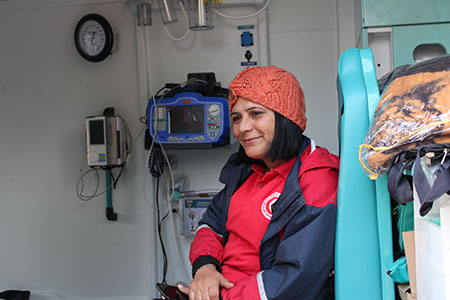
She told us about how the attacks started in Serê Kaniyê (Ras al-Ain) and how they treated a number of injured people. “They were civilians. Most of them were civilians,” she said with an angry expression on her face. She told us about the injured children. She talked about Sara, an eight-year-old girl whose leg was cut off by a Turkish bombing on Qamişlo. Her brother was killed in the attack. Jamila explained how Sara said she would give her second leg if it could have kept her brother alive. She swallowed, looked at the floor and took a short break. Eventually, she gave account of how in the last few days ambulances had been attacked from the air around Til Temir. “We can’t go out because of this.” She shook her head. “We can’t pick her up. Her friends are dying of minor injuries because we can’t get to them.” Her voice stopped for a moment. We realized how important it is for her to share what she has experienced. She talked about international law, which protects medical facilities in war zones.
She looked questioningly into the camera and asked: “What do these laws mean? Who’s responsible for enforcing them?” Again she looked at the floor. We asked her if she had anything to add. She nodded and her gaze became more determined. “We made a promise. We will not leave anyone hurt. It is us, who protect their rights. And we will give everything to leave no one behind.” We turned off the camera and at the same time we were gripped and strengthened by her words. She said that she would go to sleep now that she had had a long shift. We would continue the next day.
Our next meeting was with women of the Women’s Defence Units (YPJ). A friend of the YPJ would pick us up and take us to their base. We got a warm welcome and could immediately see how much love had been put into this place: There were many plants, a small garden and under the shade of a big tree there was a small table where we sat down. While some of them were preparing tea, more and more friends came out of the small house and sat at the table with us. The way they greeted us, how they sat down next to us as a matter of course, hooked their arms into ours and asked us how we were, we immediately felt comfortable. We drank tea and talked about the current situation. One of the friends put her index finger in front of her mouth: “Shhh!” We were quiet. “Keşîf”, she said and pointed up – drone. We heard the soft hum of the drone, but after only a seconds they returned to the conversation. They told us that drones had been in the air almost continuously for the past few days.
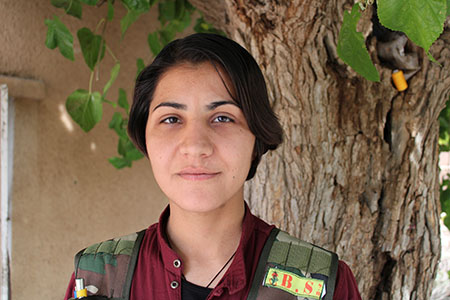
A friend was ready for an interview. Her name is Beritan, an Arab from Deir ez-Zor, who joined the YPJ two years ago. As we set up the camera, we suddenly heard a loud “WOOOMMMM”. We flinched. Beritan looked at us and laughed: “There’s probably no such thing in Europe.” Now the others laughed, too. They walked with us to a wall and a friend pointed her finger in the direction from which the sound came. “Çete”, she said- that’s what Erdoğan’s gangs are called. Behind a far hill, she said, is the enemy. The idea that there are battles just a few kilometers away seemed almost surreal as we sat down again in the sunny place in the garden. We begun the interview. Beritan talked about the necessity of women’s organization, why we can only rely on our own strength in defense and why we as women must resist the inhumane, patriarchal attacks of the Turkish state and its jihadist allies. Time and again she emphasized that this was above all an ideological struggle. We have to fight it ourselves in order to free ourselves from this ideology that tries to make us small. She radiated clarity and determination and I drew much strength from her words. The artillery strikes could still be heard a few times during the interview, but Beritan was not upset by this. At the end, she said that neither the Turkish state nor its mercenary gangs can destroy what the women’s movement has built up here – namely the hope for a free life.
When our friends bid us farewell, they told us to come back again. We wished them good luck and hugged each other. I still had to think about this visit for many days because it made me think a lot. The loving interaction between the friends, the collective life among women and the common struggle for a free personality, away from patriarchal thinking, have created something greater. Something that no air raid in the world could ever destroy. To be confronted with the brutality of the enemy and the real possibility that one of my friends might not be able to return from the front creates a feeling that since my arrival I have perceived as an incredible strength of the women’s movement. In times of difficulties, attacks or war, something worth living is created and every second is given meaning and beauty.
On our way back, we made a final stop at the Xabûr Guards – an Assyrian military council that is part of the QSD and involved in the defence of Til Temir. Four women in uniform welcomed us. Three of them were about the same age, perhaps around 30, and another is considerably older. One of the younger women has her two-year-old daughter with her, who, while we exchange information about the current situation of the Assyrians by means of translators, walked back and forth between our chairs. Madlein, the spokeswoman of the unit, told us about the massacres of the Ottoman Empire in 1915 in which thousands of Assyrians were killed. She talked about the IS attacks on the Xabûr region in 2015 and that they see the current danger from the Turkish state as the danger of genocide against their people. After a cup of tea we walked through the Assyrian village. We passed a statue of the Virgin Mary. Madlein first put her hand on the feet of the statue, then lead it back to her forehead to cross herself. We walked on to a church, and I walked a little away from our translator next to a fighter. I communicated with the little Arabic I know. It is quiet, the sun was shining and flowers were blooming along the way. Birds were flying from the garden gates of the small houses. I pointed to our surroundings and said “cenet e” – it is paradise. She looked at me and made a hand movement that meant “in the past”. Then she pointed to the empty houses and said “Europe.” All the houses were empty. The gardens were overgrown, some windows were broken and in some houses the doors were open so we could see the sunbeams dancing in the dust. She kept talking and again I heard the word “DAEŞ” – Islamic State.
We set up our camera and Madlein told us that as Assyrian women they would not accept a repetition of 1915 and 2015. She talked about the atrocities committed specifically against Assyrian women and said that it was their duty, especially as women, to defend their existence and their culture. She had a proud look on her face. After the interview with her, we asked the individual women how they came to join the military units. The fighter I had spoken to before pointed to the oldest uniformed friend. Only when our translator said that was her mother do I recognize the resemblance between them. After we say goodbye and drive back by car along the Xabûr River, I keep having to think about the mother and her daughter for a long time. Both are ready to give their lives in defense of their country. All the strong women I met that day, each with her own story, strengthened my belief that resistance is the only way. Not only to fight against something, but to be able to bring out in us, as women, the strength and beauty that the enemy is trying to destroy with all its means.
Source: Komun Academy
RELATED NEWS:

